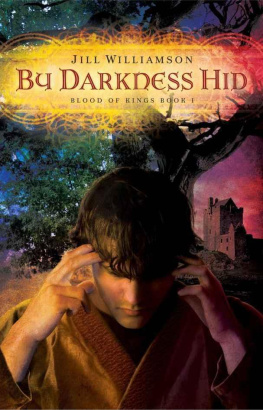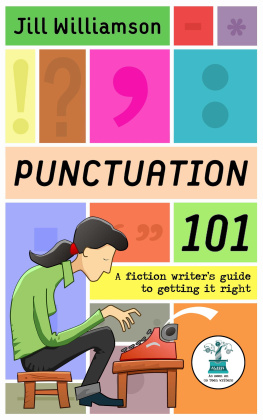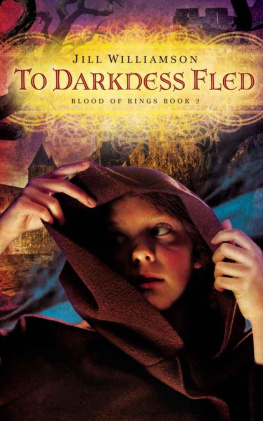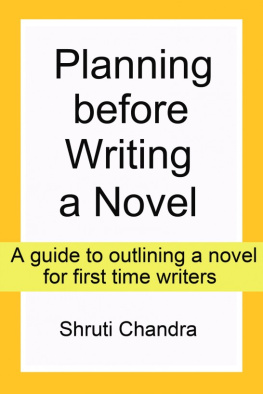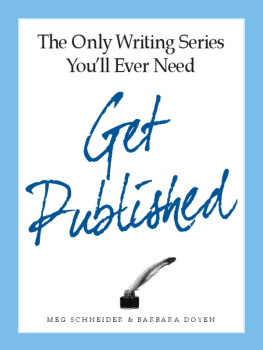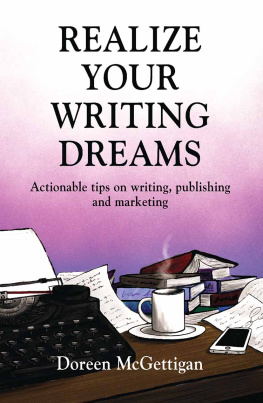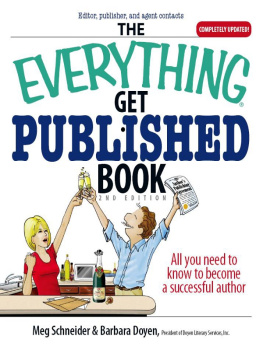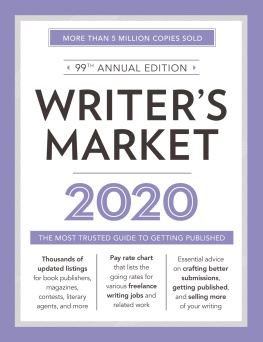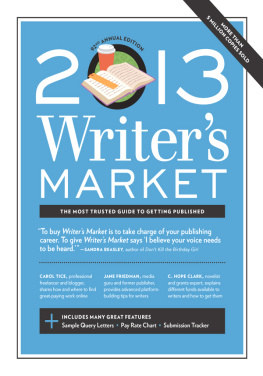Go Teen Writers: How to Turn Your First Draft into a Published Book
Copyright 2013 by Stephanie Morrill and Jill Williamson.
All rights reserved.
No part of this book may be used or reproduced in any manner whatsoever without written permission except in the case of brief quotations embodied in critical articles and reviews.
Library of Congress Cataloging-in-Publication Data
An application to register this book for cataloging has been filed with the Library of Congress.
The authors are represented by MacGregor Literary Inc. of Hillsboro, OR.
Cover Designer: Kirk DouPonce
Interior Design: Jill Williamson
Editor: Roseanna White and Chris Kolmorgen
Ebook design: Kerry Nietz
International Standard Book Number: 978-0-9887594-2-8
To the writers who hang out
with us at Go Teen Writers.
Thanks for your creativity,
questions, and support.
Hey, Teen Writers!
If you were hoping for a book from two writers who have this writing thing figured out, who have evolved beyond doubts, writers block, and insecurity, were sorry to disappoint.
While weve designed this book to be used after youve completed a first draft, it can also be used as a roadmap for making sure you have the elements of a strong story. Weve both pursued writing and publishing for about ten years now. While we still have a lot to learn, weve discovered a lot along the way, much of which we share regularly at GoTeenWriters.com.
The questions were asked the most are, How do I get published? and What should I do next?
These are big, complicated topics. Too big and complicated for mere blog posts, we decided. Hence the book.
Everyones journey is different, which we want to recognize and respect. Yet as weve reflected on our own journeys, and examined the paths of the writers around us, weve landed on a handful of steps that you can take to turn yourself into a card-carrying novelist. (Just kidding, there are no cards issued. But there may or may not be a secret handshake )
Heres what we did to get where we are now
1. We wrote a good book and made it great.
Without this, youll get nowhere.
We regularly hear from writers who are itching to get published but havent yet completed this step. Theres nothing wrong with looking toward the future and being excited about seeing your book on a store shelf someday, but that wont happen without a well-edited book.
2. We studied the industry.
Publishing is an industry with its own etiquette. Investing the time to learn it can save you a lot of embarrassment.
3. We created a book proposal and put ourselves out there.
4. We found good literary agents.
5. We learned to network with other authors and make connections with editors.
There you have themStephanie and Jills five easy steps to getting published!
Just kidding.
The steps look simple and straightforward enough when you list them in such a way, but we all know getting published is anything but. Step one can take years, the industry is ever-changing, and finding and signing with a literary agent sometimes takes longer than getting a book contract.
Its easy to lose heart and look for shortcuts. The two of us certainly have. We cant make the process easy for you, but our hope is this book will encourage you to respect your dream enough to have the patience and endurance to stick with writing, and youll find it to be a tool you can turn to time and time again when youre thinking, Okay what next?
Stephanie and Jill
Step 1
Make Your Good Book GREAT
Make Your Good Book GREAT
The Macro EditTaking Care of Big Issues
If youve written your first draft, its possible youve already built in many of these macro edit elementslike a strong cast of characters or a perfect setting. We included them here because sometimes when you edit your book, macro changes are necessary. It would have been helpful to us as new writers if wed known early on how to edit these pillars in our stories.
A note from Stephanie
Both Jill and I have found its best to take care of the big issues firstthe plot, the characters, the themebefore you focus too much on scene tension and sentence structure. My friend Sally refers to it in housing terms. You would make sure a house had a strong foundation before you started painting it.
Something else Jill and I have in common is our bare bones first drafts. We both write quick first drafts and save our editing for after we type the end. Ideally, I give myself six weeks off from a story before I start edits. This not only provides me time to do laundry and say hello to my family, it gives me enough space from the story to see it more clearly when I come back.
The first thing I do is read through my book in one or two sittings. I keep a notebook next to me and jot down the big things I noticethe plot line I foreshadowed in chapter two but never carried through. The line in chapter twelve that has a special kind of weight to it, that I want to consider expanding into a theme. After I do that, I have a good idea of what needs work. Before I fuss with dialogue or tweaking each sentence, I first tackle those big issues I noticed.
Ive always found the rewriting process to be one of the most exciting components of producing a great book. I originally ended this spiel with one of my favorite quotes about rewriting, only to discover Jill began hers with the same one. So Ill just let her talk.
A note from Jill
One of my favorite quotes is from author Michael Crichton. Books arent writtentheyre rewritten. Including your own. It is one of the hardest things to accept, especially after the seventh rewrite hasnt quite done it.
Thats so true.
But I cant rewrite a book that doesnt existat least in a very rough draft form. So I write my first drafts as quickly as possible. That way, I have something to go back and fix.
Im a visual learner, so the first thing I do after finishing draft one is go back through the book and list the chapters and scenes in order. This allows me to see the entire book on one or two pages so I can get a good idea of any plot holes. Then I think about my characters. By this time I know which ones I need to work on more, and I might spend a few days asking questions to learn more about them.
Once Ive done all that, I start at the beginning and read, tweaking things as I go. I add descriptionsince theres often little in my first draftsI edit for each point of view characters narrative voice and dialogue, I often stop to research when necessary to get my details right, and I look for places I can insert plot points and references to my theme.
When Im done, I go again. But more on that in the micro edit section.
I tend to rewrite as many times as I can before its time to turn in the manuscript. The more the better.
Thicker Plots
There are no rules in writing.
There are only guidelines.
Nancy Kress
The Story Problem
by Jill
I dont want you to think that what Stephanie and I share in this book are rules that must be followed. Every writer is different and every story is different. Thats what makes novels so great.
But there are consistent problems we see in the work of beginning novelists. And this book is meant to ask some hard questions that will get you thinking about what problems might exist in your story.
My first question is: What is your story problem?


